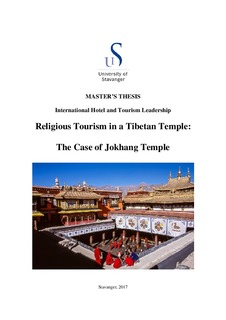| dc.contributor.advisor | Selstad, Leif | |
| dc.contributor.author | Ji, Naiwen | |
| dc.coverage.spatial | Tibet | nb_NO |
| dc.date.accessioned | 2017-10-11T13:41:33Z | |
| dc.date.available | 2017-10-11T13:41:33Z | |
| dc.date.issued | 2017-06-13 | |
| dc.identifier.uri | http://hdl.handle.net/11250/2459747 | |
| dc.description | Master's thesis in International Hospitality Management | nb_NO |
| dc.description.abstract | Since 1984, Tibet has become a destination for tourists and since then tourism has become an important factor in Tibet economy and society. Tibet has become a significant tourism destination in China and is famous as the “last Shangri-La” in the world, attracting an increasing number of tourists. However, the researches of Tibet tourism have focused either on macro policies or the construction of otherness. Little attentions is paid to religious tourism, in particular, specific features that characterise religious tourist motivations and the perceived authenticity of a religious site as well as how tourist satisfaction and loyalty can be formed at the site. The thesis sheds light upon the prospects and challenges of religious tourism in Jokhang Temple through in-depth interviews with informants, participant observation and other data. Interviews were conducted with tourists as well as an official working in the Tourism Department and a temple Guru. The results show that tourists in Jokhang Temple have different motivations which can lead them to take part in various activities during the visiting time. The study indicated that perceived authenticity is a determinant of tourist satisfaction at the temple. Issues include improving the professional skills of tour guides and avoiding an “over-commercialisation” of the site in order to improve tourist satisfaction and loyalty.
The findings are discussed in the context of destination management with reference to two considerations-namely: to combine the religious tourism with cultural heritage in order to form a strong travel attraction and travel competitiveness; and how to manage growing numbers of tourists in order to reduce negative impacts. | nb_NO |
| dc.language.iso | eng | nb_NO |
| dc.publisher | University of Stavanger, Norway | nb_NO |
| dc.relation.ispartofseries | Masteroppgave/UIS-SV-NHS/2017; | |
| dc.subject | hotelladministrasjon | nb_NO |
| dc.subject | reiselivsadministrasjon | nb_NO |
| dc.subject | Jokhang Temple | nb_NO |
| dc.subject | religious tourism | nb_NO |
| dc.subject | tourism motivation | nb_NO |
| dc.subject | perceived authenticity | nb_NO |
| dc.subject | satisfaction | nb_NO |
| dc.subject | loyalty | nb_NO |
| dc.subject | turisme | |
| dc.subject | Tibet | |
| dc.title | Religious Tourism in a Tibetan Temple: The Case of Jokhang Temple | nb_NO |
| dc.type | Master thesis | nb_NO |
| dc.subject.nsi | VDP::Samfunnsvitenskap: 200::Økonomi: 210::Bedriftsøkonomi: 213 | nb_NO |
